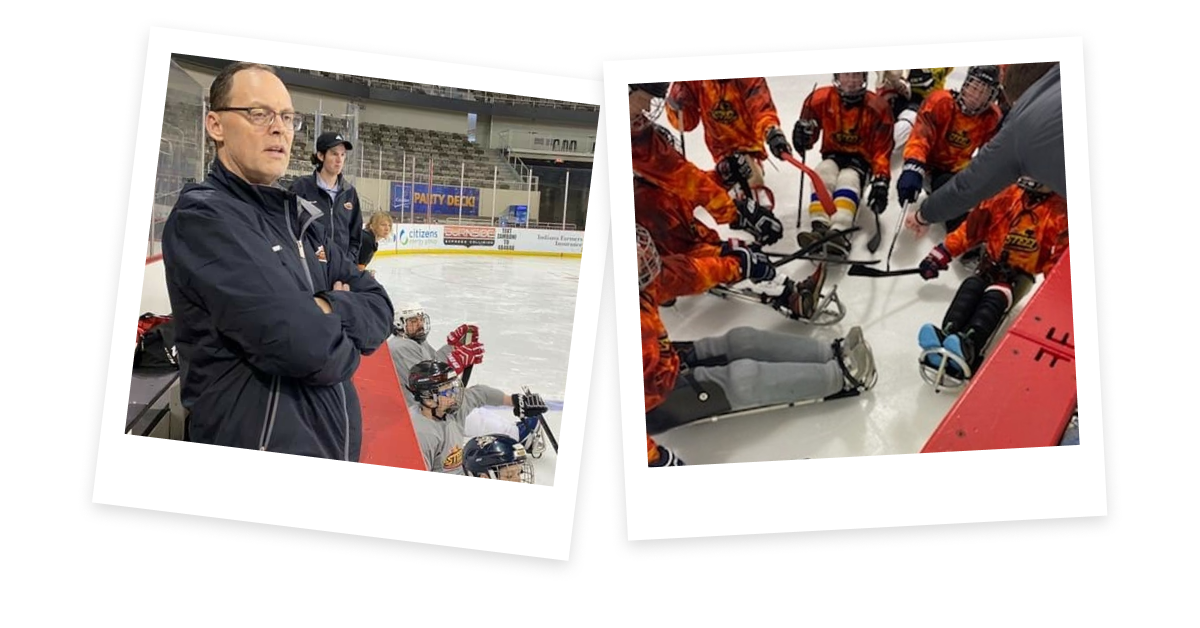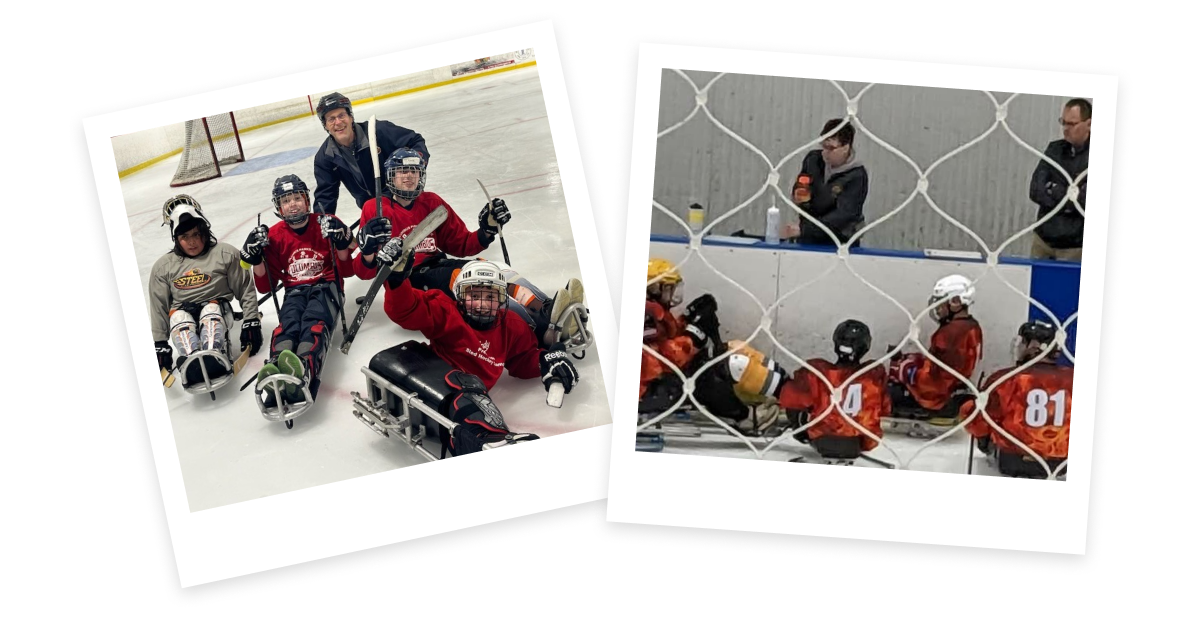
Discussing Expedient AVP Duane Weber’s Other Role: Coach. In His Own Words.
“One of the cool stories this year is we have a six-year-old. His name’s Jeremiah. He’s a quad amputee. He was able-bodied until he was two and contracted meningitis. So they had to remove all his limbs.”
Admittedly, that’s not how a conversation at Expedient typically begins. But this wasn’t a typical conversation. It was one with Duane Weber, Area Vice President in Indianapolis. He paused a second, then rushed through the next sentence.
“His grandma takes care of him because his mom wanted to give him up.”
And then, suddenly, his tone gets brighter.
“So she emails me and says, ‘do you think he can even do this?’ I’m like, ‘hell yeah, get him here. We’ll figure it out!”
The thing Duane was excited about figuring out? Getting Jeremiah on an ice rink to play sled hockey.
“The good thing about sled hockey is you can be pushed,” Duane continued. “You don’t need to be your own power.” Working with a group of high school volunteers, they were able to tape sticks to Jeremiah’s nubs and push him around the ice. “And three of these kids are messing with Jeremiah and the first couple times, the stick falls off and I look over and they’re trying to reshape it and it’s just like, awesome. And they finally get this thing out and they got him in front of the net. One of the guys is just really slowly feeding him pucks and Jeremiah’s whacking the puck. And I skate over by Grandma and she’s just got tears in her eyes, like, ‘I didn’t think this could ever happen.’”
“So that’s the impact we get to have.”
Duane’s describing the impact he gets to have as head of the Indy Steel, the youth sled hockey team he started four years ago. “I get more out of it than they do. For me, the coaching and just building the program, you know that’s my purpose. To be able to bring the experience of sports to a community that doesn’t typically have access to it is…” His voice trails off then comes back. “That’s my purpose.”
What is sled hockey?
Sled Hockey is an action packed sport similar to Ice Hockey with a couple of differences. First, players sit in a "sled" with 2 blades. Second, players have 2 smaller hockey sticks, one in each hand. One end has a pick on it to help pushing around the ice. The other end has the blade for stickhandling, passing and shooting.
- IndySledHockey.org
Sleds aside, sled hockey isn’t all that different from standup hockey, the version of the game viewers are more used to seeing in professional leagues, on TV, and at rinks throughout the country all winter long. Skaters take the ice on sleds with blades attached to the bottom. “Typically, there’s no modifications,” Duane explains. “Same net, same rink, same rules. The (extra) players sit perpendicular to the benches on the ice (instead of on them). There’s a little strategy there.” He laughs. “Oh, [the puck] magically directed right toward your teammate even though it was headed right toward the opponent? Right.”
Four years ago, Indianapolis didn’t have a sled hockey team. Duane, who has coached college, high school, and at various levels of youth hockey, was coaching in an under-14 league and preparing to retire from coaching altogether when he walked into a rink in Bowling Green, Ohio. He saw kids in wheelchairs and a double amputee enter the building. He got his team to their locker room then went to watch the sled hockey game. Eventually, he approached the couple running the session. “And they were talking about the impact they had on them and they got tears in their eyes. And I got tears in my eyes. And I’m like, ‘oh God, how do I tell my wife I want to bring sled hockey to Indianapolis?’ But it was an easy sell. She was on-board, supportive.”

When he got back home, he set the wheels in motion, starting an equipment drive. “I set up a watermelon box up at the local ice rink and I was getting calls every day. ‘Hey, dude, you got to come get this.’ ‘Yeah, your box is full again.’ ‘Your box is full again.’ I had 37 sets of equipment donated. I mean, just really cool. Over the course of three weeks, we had all the equipment.”
With the help of friends, he set up a 501(c)(3) and tapped some connections at USA Hockey, the governing body, to get the team registered. Starting April 1, the whole process, which normally takes anywhere between six months and a year, took six weeks. By June, they had a try-out and 12 people showed up. The Indy Steel was born.
The team’s motto? “On the ice, there are no disabilities.”
While equipment donations like helmets, gloves, and other padding were plentiful, there was still the matter of specialized sleds and sticks. The sleds cost about $800 a piece and take roughly six weeks to deliver from one of only two manufacturers in North America (one in Michigan and one in Canada). The sticks cost about $100 a pop, and in sled hockey, players use two sticks at a time. “So yeah, we’ve had to do a lot of fundraising to pay for that, because we still don’t charge the players.”
Fast forward four years from those June tryouts: Duane and his team returned home in May from St. Louis, where they won the national champions (Youth Tier I division) at the USA Hockey Disabled Hockey Festival, a tournament of teams from around the country.
Before playing sled hockey for the Steel, almost nobody on the team had played a sport. One member had played some wheelchair basketball, but the rest were beginners. “It’s just amazing how far they’ve come and how dedicated they are after just four years.”
He continued telling me about the competition and winning the national championship. “We had a reporter come out to practice and she was watching. After, I said, ‘what do you think?’ She goes, ‘you yelled at them. You’re coaching them like my high school volleyball coach coached me.’ I said, ‘that’s what they want.’ I’ve got four or five kids who, to them, this is their high school sport. I coach them like that. And we have Jeremiah, who’s six. You try to have fun (with him). Same thing with the adults. Some are really competitive and some want to just skate around and enjoy being with their peers.”
And how does his experience coaching the Steel translate to his role at Expedient, running the Indianapolis sales team?
“I lead differently. I’d say with more nurturing and more empathy, and a lot of that has to do with coaching. A mom one time said, ‘we’re all not abled in some way.’ You see it with these kids. But we’re all dealing with stuff. We’re all working through things. So I think that’s carried through to my team (at Expedient). They’re all dealing with things, so I have a lot more empathy, a lot more nurturing. And I meet everyone where they’re at. I think the biggest disservice you can do is to coach everybody the same.”
Want to get involved?
According to Duane, teams are always looking for volunteers to help out. You don’t even have to know how to ice skate. “Our biggest challenge with the athletes is transportation.” The Steel have lost team members because they couldn’t get regular transportation to the rink, or pay for transportation to tournaments outside Indianapolis. “Some of those guys are like, you know, ‘I don’t know if I can go this weekend because we’re going to Pittsburgh and it’s going to cost me $100 in gas,’ and so one of my big, hairy, audacious goals is to fundraise and get a sprinter van. It will take everybody. The adults, especially parents, with kids can get there, but to get (everyone) through the games and carry their equipment. So that’s my next effort.”
Not in Indianapolis? You can still get involved. There are adaptive sports in every community. Look online for local organizations to get in touch with. “I would say even just more anything, just find your personal purpose, you know, what are you passionate about? Figure out how you can change the world and it can happen at work and it can happen outside of work. The opportunities are out there and it’s incredibly rewarding and fulfilling to be able to do that.”
You can reach Duane at Duane.Weber@expedient.com.
